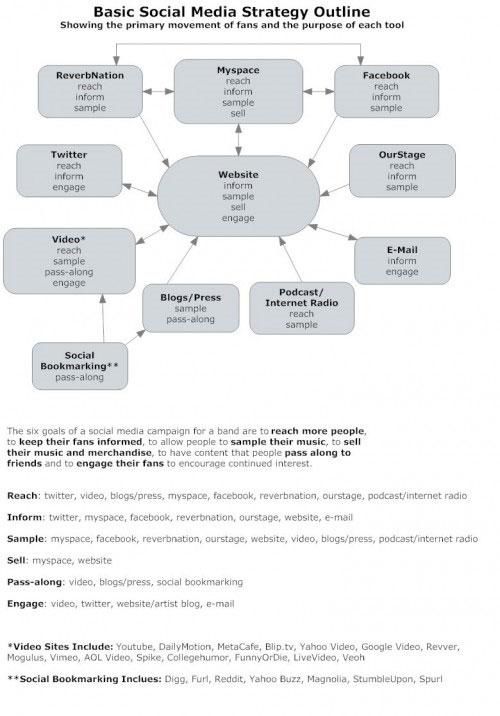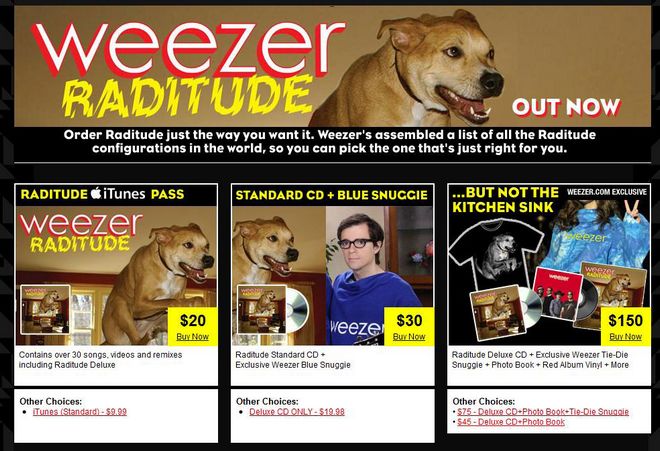Have you ever wondered how to succeed online as a music band? Hints and tips for a perfect digital musical strategy, from social networks to SEO and viral marketing.
By Virginie Berger (@virberg, www.digitalmusic.tumblr.com), former head of marketing at Mypace France and now music marketer.
Here is the first part (out of five) of the article ! Be sure to check out the others in the next few days…
The full article is available in PDF and on Slideshare
__
What does it mean to be an artist in 2010? What is a record company? A music company? A recorded music company? How do we define and work on music marketing within an ever-changing environment?
“And what about music?” you might ask me. Surely, music is the core of everything. The artist should be able to offer a type of music in a place where someone will want to listen to it.
Define your objective
First of all, you can’t throw yourself into marketing action, as small as it may be, without defining your objectives beforehand. It doesn’t mean you have to draw a 5 years business plan. But you need to define the results you expect from your action. What is your objective behind your action? Is it to improve your online presence? OK, but what for? Touring? To be signed? Do you want to sell records, products relating to your music (i.e: merchandising), gig tickets? How many? Why are you on Twitter? What are your expectations?
At present, we are witnessing an excess of actions in the music industry. Are there any results at the end of the day? What is the most important key? Time spent on actions or the final results from the actions?
Most people get frustrated with their online results because they confuse tactic and strategy. It seems that they prefer getting into action, even before defining the reason of their actions. My father used to tell me: “A vague objective leads you to perfect stupidity.”
Back to basics
Before starting off, let me remind you of a few tiny things:
> Not only do fans want to connect with your music, but they also want you to connect with them.
> Three steps for your expansion: getting attention, getting connected, and getting monetized.
> Adding value to what you create is the only way to compete with free of charge products.
> Cwf + RtB = $$$ (Connect with Fans + give them a reason to buy = monetization)
> Why get attention and get connected to your fans? Because the biggest issue in the music industry is not actually about the price, but about the millions of content that is available. Nobody knows what to listen to and from what source? Which is why being visible and create a community space will give you a way to make money.
> You can’t force people to get into a relationship with you. But, on a daily basis, you can prove to them you are worth it!
Don’t forget: you don’t have to follow EVERY SINGLE thing I am describing. Focus on what’s important to you in terms of your objectives.
So, let’s get down to business: what will you learn from this white paper?
> If you are a band but don’t have a website, then you have just failed your career
> MySpace is so 2004, but it’s still a good idea to create your MySpace page
> Facebook, but why?
> Knowing your fans is vital, but what is the best data-analysis?
> Why register on Bandcamp? Because it’s like MySpace but slightly better
> You might not be Lady Gaga, but you can learn how to get 1 million of viewers on Youtube
> Why email and newsletter are still a weapon of mass seduction?
> Nobody uses Twitter but it reaches everybody
> Flickr, Wikipedia, Deezer, Spotify… strange words but you should use them!
> SEO is not a disease but a medicine actually
1 - Your Website
Everything goes very fast. What is hype now might not be in a near future (Don’t believe the Hype, never!)
MySpace was supposed to revolutionise the music industry. Now it’s Facebook (if you don’t have your fan page honey, then walk on the wild side), Twitter…
Some years ago, it looked very chic to own your MySpace URL. Not anymore. Twitter does. OK, but where will be Twitter in a few months time or a few years time? And what about the augmented reality? What for exactly?
To sum it up, what will you gain from it? ROI (Return On Investment) must be higher that your time spent on your action making. If not, it would mean you made a mistake about your action.
This is why your website has to be the core of ALL your online strategy.
Whatever exists, social networking, blogs, microblogs, your website only must be at the centre of it all. Microblogging will never replace blogging. MySpace will never replace your website. Staying uniquely on MySpace will NEVER get you to know your fans.MySpace is like a display that should lead them somewhere else. Mind you, social networks and your website are perfectly complementary. You need them all. Your external presence and outwards links must lead to your website.

A - Renew your content and offer it
Most of artists’ sites don’t offer their fans and visitors a real experience on their websites. They are usually static and motionless, and rarely updated. Your site has to be a channel of diffusion and distribution. It allows you to get connected to your fans, to get to know them, follow them and interact with them.
You should update it on a regular basis, so it matches the image you wish to project. You have to offer: photos, videos, music (I take responsibility for it: offer music). Your fans and visitors chose to come to your website, so they can meet you. But if you are not around, the experience won’t be rewarding for either of you. Fans won’t be waiting for two years, or in between albums, to receive news from you. You have to be there.
Offer as much content as possible. Then again, OFFER… unknown recordings, studio or unplugged recordings… Get someone to shoot some footage of you. Not only onstage but outstage as well. Before or after a gig. You discovering a town. Make podcasts explaining what inspires you. Don’t hesitate to comment on your gigs. Allow your visitors to be able to contact you or comment everywhere. Wall, email, forum. Open your diary and update your gigs dates, TV and radio promotion.
B - Create a blog
Creating a blog allows you to be closer to your fans. Do not hesitate to post info, comments, music links you like. Let your viewers share your articles on Facebook, MySpace… Blogging has lots of advantages. Ask an artist who likes your music to say so (i.e.: Sigur Ros/Fanfarlo, Passion Pit/John Mayer). Your presence is multiplied and you are improving interaction with your fans. You can post different types of contents, with key words, so your online presence is increasing thanks to SEO (we’ll talk later about it).
But careful, again the blog is not your website. It can’t be your unique online strategy. It’s complementary. Do not hesitate to tease your viewers, play with them and inspire them.
C - Let’s talk about your site
1 > Music has got to be central. It might sound obvious, but I can ensure you that most of the time it is not.
2 > If you are not sure about which platform to use, try Soundcloud. Their Player is even customisable.
3 > Let your fans upload and embed their own videos, photos, remixes, comments, etc…
4 > You might want to use Wordpress as a tool for publication.
5 > Don’t forget your “shopping” page. A tool like Bandcamp will take care of everything (I’ll give you more details on #3). I would like to lure you on Exsonvaldes French group Bandcamp. Now Bandcamp combines on your website.
6 > Your web page design has to be light and fast.
7 > Drop Flash. It is a SEO jilt. It gives sore eyes and prevents navigation from a mobile. You can try CSS. Flash, for a whole website, was OK in 2002…
8 > Drop any complicated things as well that will force your viewer to wait for 5mn before getting on your site. (S)he wants to see you rapidly. Don’t we live in a simple era? Ipod is a rectangle with a circle. Google is a research application. Internet users are experimented and want to be fast. A 5mn loading time might flatter the artist ego, but you are losing contacts here.
Best artist sites: www.nin.com, www.weezer.com, www.fanfarlo.com, www.cyrilpaulus.com.

__
Stay tuned ! The four following parts of the article are to be published soon !
The full article is available in PDF and on Slideshare
Email : virberg at gmail.com
Twitter : @virberg